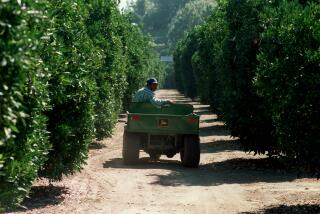What’s in a Name? Two Different Family Legacies
Orange County is full of reminders: Chapman College, two Chapman avenues and, of course, the Chapman House, official residence of Cal State Fullerton’s president.
Who are these Chapmans who so dominate the landscape? Actually, the name belongs to two historic but unrelated Southern California citrus-growing families.
Contrary to popular belief, the Chapman Avenue bisecting the heart of Orange was not named for the chief benefactor of Chapman College, businessman and citrus magnate Charles Clarke Chapman. Rather, it was named for attorney Alfred Beck Chapman, who with his law partner, Andrew Glassell, founded the township of Orange in 1869 with 1,385 acres of land given as payment of legal fees.
Chapman the lawyer, who preferred his payment in real estate, soon had extensive holdings. He also served as Los Angeles city attorney and later was elected district attorney of Los Angeles County, when Orange County was still a part of it. Not to confuse him with the other Chapman, the citrus magnate, this Chapman is credited as the first to introduce the Valencia variety of orange to Southern California in the early 1870s, when he planted English seedlings on his ranch in the San Gabriel Valley.
Fullerton’s Chapman Avenue, which runs east and west like its counterpart 5 miles to the south, was named for Charles Clarke Chapman, whose roots in Orange County run deeper.
In 1894, Charles Chapman moved from Chicago to Southern California, where he and his brother, Frank, soon acquired citrus and fruit ranches in Covina and the Fullerton-Placentia area. With Valencia orange trees already planted from the buds of Alfred Chapman’s grove, a new family of Chapmans established themselves as pioneers in the citrus industry.
The brothers split the holdings in 1899, and Charles Chapman took the high-producing 175-acre fruit ranch known as the Placentia Orchard Co. Later dubbed “The Orange King of California,” he was one of the first to use attractive crate labels as a selling device, and his revolutionary packing methods meant better-quality fruit.
Charles Chapman became the first mayor of Fullerton at its incorporation in 1904. He was touted as a Republican gubernatorial candidate in 1914 and as a vice presidential candidate on Calvin Coolidge’s ticket in 1924. He withdrew his name at the last moment both times but remained a stalwart supporter of the Grand Old Party.
Charles Chapman was also a devout member of the ecumenical Christian Church (Disciples of Christ). In 1912, he offered $50,000 toward creation of a church-affiliated college in Southern California. In 1919, he issued a challenge grant of $400,000 for such a college. It was quickly matched and exceeded, and by 1920, the Berkeley Bible Seminary in Berkeley closed its doors and became California Christian College in Los Angeles.
In 1934, fellow trustees decided to recognize Chapman’s years of service and financial generosity by renaming the college for him.
Ten years after Charles Chapman’s death in 1944, the college moved south to the old Orange High School campus, just two blocks north of the avenue named for that other Chapman.
One of Charles Chapman’s three children, C. Stanley Chapman, and his wife left another public reminder: the El Dorado Ranch in Fullerton that is now the official residence of Cal State Fullerton’s president. It was donated in 1989 by C. Stanley Chapman’s three children in memory of their parents, both longtime supporters of the state university.
At Chapman College--to be renamed Chapman University on Tuesday--Charles Chapman’s legacy lives on in his youngest child, Irvin Clarke Chapman. Known to all as Ernie Chapman, this 80-year-old Chapman College alumnus, who met his wife there in the 1930s, still remains an active trustee. Two of his grandsons, senior Travis Hull and his sophomore brother, Jason, are now the 14th and 15th members of the Chapman clan to attend the college.
More to Read
Sign up for Essential California
The most important California stories and recommendations in your inbox every morning.
You may occasionally receive promotional content from the Los Angeles Times.










